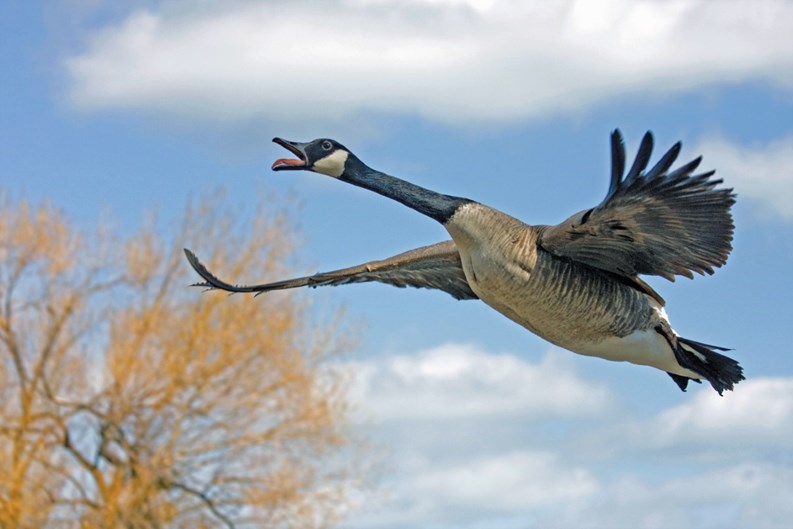They eat a lot and cause a mess. They overstay their welcome and can become aggressive when challenged. No, they’re not your no-account relatives—they’re resident Canada geese.
These 12- to 15-pound birds were once migratory animals, but many began to lose that instinct when they were employed as live decoys by hunters in the early part of the last century. Live decoys were outlawed by the 1930s, and the captive geese were turned loose. Well-meaning conservation efforts to re-introduce the geese into areas they had once abandoned also were a bit more successful than originally intended. Once freed or reintroduced, many geese decided that migration was perhaps too much of a hassle, and decided to stick around—multiplying exponentially ever since.
These resident geese can now be found eating loads of cultivated grass, loitering around co-ops and condos on golf courses, parkland, and other green areas, leaving their droppings and feathers everywhere. And it’s more than just a landscaping or picnicking nuisance—if a flock is large enough, it can even contaminate water supplies—or bring down a commercial aircraft!
Like homeowners weary of guests who, stay too long, condos are looking for ways to move the geese off their property. But, like with removing guests, condos face an uphill battle because amenities that geese like include landscaped ponds (great for swimming and protection from predators) and short, manicured lawns (great for grazing). Because there is so much for geese to like at condos and co-ops, it often takes a mix of lethal and non-lethal approaches to move them off the property, says Kim Gurlavich, a wildlife specialist with the U.S. Department of Agriculture’s (USDA) Wildlife Services Program in New Jersey.
“The more angles you approach it at the better off you are, because there’s not one quick fix,” she says. Approaches listed by Gurlavich include making the condo less hospitable, harassing the geese, limiting their reproduction and, finally, euthanizing the animals.
Evicting the Geese
The first step in making a condo less hospitable to geese is to stop feeding them, no matter how “cute” some residents may find them. A condo or co-op rule outlawing feeding geese—along with a sizable fine to those flouting the rule—is a good way to start.
In addition to removing easy food sources, an escalating program of harassment tactics can also be effective in getting rid of geese.
Geese don’t like unusual noises or sights, so many HOAs put out shiny or noisy objects like flags, strips of flashy metal or noisemakers to scare the creatures. Condos with small ponds have drafted hobbyists who use their radio-controlled boats to chase the geese around the water. Enough of that, and the pesky avians usually strike out for calmer environs.
Another way to make geese uncomfortable in the water is to run twine or wire grid lines a few inches above the water’s surface, which makes it difficult for them to take off.
On land, trained dogs (typically border collies or Australian shepherds) have also been employed to harass geese. These dogs can have a rollicking good time keeping the geese moving and uncomfortable.
One such firm that supplies dogs to co-ops and condos struggling with geese is Geese Police, which sends dogs all over New Jersey from its home base in Howell.
According to Joe Kohl, company sales manager, the 35- to 50-pound hounds employed in the field have a physique and mannerisms that makes geese edgy. “They stalk, they stare, they have a wolf-like glance called ‘The Eye.’ Their head is down, their tail is down and they stalk the geese.” While the nervous geese may fear for the lives, the dogs aren’t trained to kill. “The geese are never touched,” explains Kohl, but they certainly get tired of being kept constantly on the run, and soon move camp.
Harrier dogs are usually brought to a goose-infested community two to three times a day, seven days a week, says Kohl. The dogs will stay from 10 minutes to one hour in a session, depending on the number and tenacity of the geese. It usually takes six to eight weeks to get the geese to permanently change their habits and not return to a property, says Kohl.
Unfortunately, all of the harassment tactics share a common failing—the geese can adapt or become habituated to them. Geese can become accustomed to noise, inured to the presence of shiny mylar flags, or simply return next year after the dogs are gone.
Other Approaches
Another way to drive geese off the property involves the use of repellents, like FlightControl Plus. This EPA-approved repellent is applied to a condo’s turf. When geese munch on the treated grass, they get an upset stomach. The repellent also contains a compound that absorbs ultra-violet light, which only geese can see. When geese later see the repellant-treated grass, they associate it with sickness and move on, seeking food that doesn’t make them ill. While repellents can work, they can be labor-intensive, requiring reapplication after every rainfall.
Another approach to keeping the goose population down is by disrupting the animals’ breeding cycle, typically by puncturing their eggs, burying them, or “addling” them—smearing them with corn oil to prevent hatching. These methods are effective, but time-consuming, as the nest must be located and every egg treated.
Further complicating the procedure is that permits are required to addle eggs in New Jersey. Those seeking permission to addle eggs can apply for a permit online at https://epermits. fws.gov. According to Gurlavich, thoroughness is needed for an addling strategy to be effective, “You have to constantly go back when they’re nesting to check—because they’ll lay new eggs once [one clutch of] eggs are addled.”
Nuclear Options
While most residents and boards would prefer non-lethal means of getting troublesome geese off their properties, it’s fairly safe to say that a dead goose will not be returning to peck and poop another day. Hunting directly reduces the goose population, though times for hunting geese legally in New Jersey are limited to three short seasons, and many developments have houses too close together to permit safe hunting. In addition, the hunters themselves need a variety of licenses, including a New Jersey hunting license. For information about goose-hunting in New Jersey, boards can contact the Bureau of Wildlife in Trenton at 609-292-6685, or online at www.njfishand wildlife.com.
Even more controversial than hunting geese is the practice of “gassing” them—a method that has been used in a few New Jersey communities in recent years. Gassing is usually done during molting season, when geese can’t fly, and involves herding the animals into enclosures, where they’re “put to sleep” with toxic chemicals, using guidelines approved by the American Veterinarian Medical Association (AMVA), says Gurlavich.
Gassing has been widely condemned by the Humane Society of the United States. “We have issues about the way they’re using this method,” says Maggie Brasted, director of Urban Wildlife Conflict Resolution with the society. “They are putting these animals in big chambers with lots of animals together, and the AVMA standards don’t address that part of it. The main issue is these animals don’t need to be killed. You’re really talking about killing animals just because people find them inconvenient.”
Fence ‘Em In
As an alternative to killing geese, Brasted and Gurlavich both recommend modifying the condo landscape to make it less accommodating to the feathery fowl.
Short, trimmed grass—which many condos maintain with pride—is like “paradise” for geese, says Brasted. “Grass that’s fertilized and watered—that’s the best free buffet a goose can find.” Because geese also associate short grass with safety because it allows them to spot predators coming at them, Brasted advises HOAs to consider planting taller plants, or install fencing, especially around ponds.
Because geese cannot fly during the molting season from mid-June to early-August, they need to be around water—which provides a haven from predators for them and their chicks. Geese also like easy access between water (safety) and grass (food).
Installing fences around ponds can convince geese to move elsewhere, says Brasted. “You want to have a barrier, something physical between the open water and their food. You want them to work harder. They can fly, but they’d really rather walk. You want to make your site less convenient.”
Installing gravel in place of grass, along with other landscaping modifications, such as berms, that limit lines of sight for geese can also contribute to making condo grounds less accommodating , says Brasted.
Most professionals agree that a combination of harassment with some simple landscape modification can be enough to get rid of the geese without resorting to euthanasia.
And Canada geese, Brasted says, are actually misunderstood. “They’re wonderful animals who are just trying to make a living raising their families in a habitat that we created that’s perfect for them,” she says. “We can take simple steps to change that habitat to make it less appealing. There are humane ways to deal with it. There’s no need to kill the geese at all.”
Jim Douglass is the managing editor of New England Condominium, a Yale Robbins’ publication.







Leave a Comment